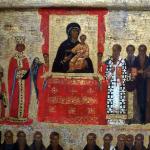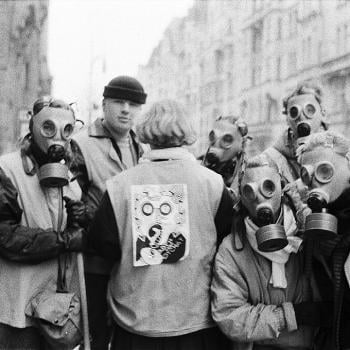
What God made was good. “And God saw everything that he had made, and behold, it was very good. And there was evening and there was morning, a sixth day” (Gen. 1:31 RSV). It was, indeed, wonderful beauty to behold, as Louis Armstrong sung:
I see trees of green
Red roses too
I see them bloom
For me and you
And I think to myself
What a wonderful worldI see skies of blue
And clouds of white
The bright blessed day
The dark sacred night
And I think to myself
What a wonderful world“What A Wonderful World” Louis Armstrong ( lyrics by Bob Thiele and George David Weiss)
Why, oh why, do we let something so wonderful be destroyed? Why do we show little to no care for God’s good creation? Why, especially, are Christians so indifferent to the environment, indeed, indifferent to the way humanity is destroying God’s wonderful world? We were called to take care of it, to be stewards over it. Sadly, we have shown ourselves to be are evil stewards, and so we must heed the warning of the Apocalypse: “The nations raged, but thy wrath came, and the time for the dead to be judged, for rewarding thy servants, the prophets and saints, and those who fear thy name, both small and great, and for destroying the destroyers of the earth” (Rev. 11:18 RSV).
We have been informed time and time again concerning what we have been doing to the environment and the climate change which comes as a result of our actions. We have seen the effects of climate change already causing incalculable damage and death, and we have done nothing. Time and time again we get a new report showing how precarious our situation is, and each time, we find the situation is much worse than the last. We must take seriously what we are being told in the newest IPCC report which, as Damian Carrington wrote, warns us about what is soon to come to pass if we do not change our ways:
Heat is killing more people, drought is killing more trees and warming oceans are killing more coral reefs, the nurseries of the oceans. But without action, worse is coming, the report said, and faster than scientists had thought.[1]
Billions of people are vulnerable, as Jeff Tollefson explained:
Between 3.3 billion and 3.6 billion people — more than 40% of the world’s population — live in places and in situations that are “highly vulnerable to climate change”, the report estimates. Some are already experiencing the effects of climate change, which vary by region and are driven by factors such as geography, how that region is governed and its socio-economic status. The report also references for the first time “historical and ongoing patterns of inequity such as colonialism” that contribute to many regions’ vulnerability to climate change. [2]
Instead of bringing God’s saving grace to the world, instead of being good stewards of the earth, we have become wicked, evil servants, harming what God would have us elevate and make better. Why do we defile such a wonderful world? Why, especially, do Christians, who say they love God, show so little care for God’s good creation? How much of that wonderful world must pass away before we take notice?
We must take the situation seriously. We must realize how great a sin is involved in our destruction of the earth around us. Even if there would be no deaths associated with our sin, we should not stand back doing nothing, but when we know that our inaction will lead to mass deaths, we become culpable for them when we do nothing. Why are Christians often so focused on minor, petty sins, when such great ones lie before them? We seem to ignore the hierarchy of truths and the morality which flows from that hierarchy, ignoring what Scripture, science, and moral theology would have us do.
The creation accounts in the book of Genesis contain, in their own symbolic and narrative language, profound teachings about human existence and its historical reality. They suggest that human life is grounded in three fundamental and closely intertwined relationships: with God, with our neighbour and with the earth itself. According to the Bible, these three vital relationships have been broken, both outwardly and within us. This rupture is sin. The harmony between the Creator, humanity and creation as a whole was disrupted by our presuming to take the place of God and refusing to acknowledge our creaturely limitations. This in turn distorted our mandate to “have dominion” over the earth (cf. Gen 1:28), to “till it and keep it” (Gen 2:15). As a result, the originally harmonious relationship between human beings and nature became conflictual (cf. Gen 3:17-19).[3]
We are to take care of our neighbor, even as we are to take care of the earth; the two go hand in hand, and so our daily liturgy, our daily service to God, should include the two together:
The Holy Great Church of Christ emphatically highlights the indivisibility of the natural environment’s protection and the philanthropic care for one’s neighbor. Both an eco-friendly stance and the recognition of the sacredness of the human person are a “liturgy after the Liturgy,” vital dimensions of the Eucharistic actualization of the Church. The life of the Church is a manifest respect for creation, as well as the place and the way of experiencing the culture of personhood and of solidarity. [4]
This is why Pope Francis says: “The climate is a common good, belonging to all and meant for all.”[5] Sadly, we seem to depreciate that good, to think the wonderful world itself is not worth saving. Often this is because it is seen as inconvenient or economically costly to do things differently, but again, that is a short-sighted view; the long-term damage from our destruction of the earth will come with a much greater economic price in the future than if we followed our duty and took proper care of the world today. That is, of course, if we will be able to save it, which, though we can and should hope we can, we must realize our failing to do our duty to protect God’s wonderful creation might truly lead to its unjust destruction and with it, our own.
We must do what we can to save the earth; since not doing so is a sin, indeed, a great sin, we cannot pit saving the earth away from the salvation of souls. The two go together. We must work out our own salvation with fear and trembling. There is no room left for neo-quietism.
Inactivity is inconceivable when in full knowledge of the shared great contemporary challenges of humanity. Indifference toward our suffering brethren and toward the destruction of the “very good” creation, is an offence against God and a violation of His commandments. Wherein exist respect toward creation and tangible love toward man, the “beloved of God,” therein God is present.[6]
It should be inconceivable that when we look to the wonderful world around us and see it being defiled, we think we can and should do nothing. It is inconceivable that some can look around and say everything is still fine. Selfishness which doesn’t care for what happen to future generations of humanity is nihilistic, not Christian. Any Christian who thinks that way shows themselves to be unfaithful servants and must be ready to be held accountable for their infidelity (cf. Lk. 16:1-13). Why, then, do we find so many who claim to be Christian doing all they can to interfere with and limit all the environmental work which we need to do in order to protect the earth?
We have been given a wonderful world to protect. Let us to do before it is too late.
[1] Damian Carrington, “This Climate Crisis Report Asks: What Is At stake? In Short, Everything,” in The Guardian (2-28-2022).
[2] Jeff Tollefson, “Climate Change Is Hitting The Planet Faster Than Scientists Originally Thought” in Nature (2-28-2022).
[3] Pope Francis, Laudato si’. Vatican translation. ¶66.
[4] Patriarch Bartholomew I, Encyclical of Ecumenical Patriarch Bartholomew for the Feast of Indiction and First Day of the Ecclesiastical Year and the Day of Environmental Protection (9-2-2021).
[5] Pope Francis, Laudato si’. Vatican translation. ¶23.
[6] Patriarch Bartholomew I, Encyclical of Ecumenical Patriarch Bartholomew for the Feast of Indiction and First Day of the Ecclesiastical Year and the Day of Environmental Protection (9-2-2021).
Stay in touch! Like A Little Bit of Nothing on Facebook.
If you liked what you read, please consider sharing it with your friends and family!













